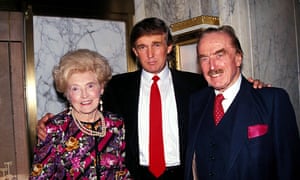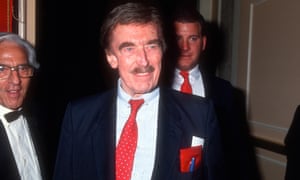He revenges he retaliates he pays back.
The art of understanding The Donald is in demand right now. His relationship with his father helped shape him – but they’re not as alike as you’d think

The art of understanding Donald Trump is much in demand right now. What is his appeal? Why does he talk in that very recognizable cadence? What is his relationship with truth, exactly? And how does he manage to spout out such gibberish – especially in front of the editorial board of the Washington Post – and get away with it?
There are many possible angles of attack. We get op-eds about his alleged similarities with Hitler, about the era of Republican decadence, about how the media gives him too much attention. But one angle that largely goes unexamined is the place even the dimmest of therapists would start: his dad. And of course, there’s more to heredity than money. For example, there’s hair.
Everyone agrees that Frederick Christ Trump (the biblical middle name came from his mother’s family) was a more retiring sort than his son, Donald. But he was not immune to the siren song of hair dye. According to Gwenda Blair’s book The Trumps: Three Generations of Builders and a Presidential Candidate, he was, late in life, particularly fond of a shade of red that bore a hint of magenta. Photographs also reveal that Fred liked to wear his hair a little longer than the average man, combed up into a smooth wave away from the head. Stop me if this starts sounding familiar.
And then there’s the myth of the self-made man. In his autobiography, The Art of the Deal, Donald claims that he learned a strong work ethic from his father. “I never threw money around,” he also wrote with a straight face in those innocent days before his first bankruptcy, and before the Apprentice let America get a view of the inside of his apartment. “I learned from my father that every penny counts, because before too long your pennies turn into dollars.”
That sounds nice. Unfortunately, The Art of the Deal is a difficult book to trust, not least because it contains at least one giant whopper with respect to Fred: it claims that the Trumps were of Swedish ancestry, when in fact they were German. As the world knows now, courtesy of John Oliver, the family’s original name was Drumpf and Fred even spoke German. But he, too, worked to conceal this, in part because at the height of his working life it wasn’t such a good idea to be a German in America. In the late 1940s and 1950s, it gave off entirely the wrong impression.
Though perhaps, in the end, it would not have been a wrong impression: last fall, reports surfaced that Fred Trump may have had ties to the Ku Klux Klan. In 1927, the New York Times reported that a Fred Trump was arrested in Queens during a Klan rally of about 1,000 people. The address matched the address of Fred Trump’s childhood home. To the New York Times itself, Donald Trump replied, “It’s unfair to mention it, to be honest, because there were no charges. They said there were charges against other people, but there were absolutely no charges, totally false.”
And although Fred Trump’s fortune was made mostly in building low-income housing, he had repeated run-ins with civil rights groups about racial discrimination in his housing allocations. In fact, in Donald Trump’s first New York Times mention in 1973, he’s defending his father and his company, Trump Management, from charges that they discriminated against potential black tenants, outright refusing them apartments because they were black. (The matter was settled without the Trumps admitting to any guilt.)
“His story is classic Horatio Alger,” Donald Trump said, bulldozing right over that narrative in The Art of the Deal. But as reported in the Blair book and numerous articles about Trump over the years, Fred Trump actually didn’t start out in poverty.

Fred Trump’s endeavors were much less flashy than his son’s, of course, and Donald benefited from the fact that the Trump family’s eldest son, Freddy Jr, never wanted to be part of the family business and died at 43. But few men of Donald Trump’s age and virility are eager to see themselves as the beneficiaries of privilege. To prove you were a man, you were supposed to come out of your (mansion-like) cave and eat only what you killed yourself.
But Trump bent those rules for himself, taking his father’s money to get himself established. The Washington Post tried to do the math on that recently, and they came up with no clear answer. Trump says he simply took out a small million-dollar loan when he was getting started, and numerous articles over the years suggest Donald Trump took out several other loans from the Bank of Dad. Once, to evade bankruptcy law, Fred Trump lent his son $3.5m in casino chips. And that’s not to mention his actual inheritance when Fred Trump died in 1999.
Trump’s grandfather Frederick Trump, who also invested in real estate, left behind an estate of just over $30,000 when he died in 1918, according to Blair. It would be the equivalent of just under $500,000 in today’s dollars. And Trump’s grandmother, Elizabeth Christ Trump, was actually the one who set up the family business. According to Blair’s book, 15-year-old Fred Trump simply slipped into the role he named for her. He made the best of the situation, for sure. But it was more like a cheap-suit-to-riches story.
It is true that Fred Trump kept things going by penny-pinching. A 1940 interview in American Builder and Building Age compared him to Henry Ford, the car magnate, because Fred Trump hated to borrow money. He was also cheap on the overhead. “The stories that are told about Fred Trump are legion,” the profile said.
“For example, until last year he never had an office, and carried all his bookkeeping records around in his pocket. The ‘office’ he now has is a little structure of about 90 square feet of space in which the only occupant is a girl to write letters and answer the telephone. He still does most of his office work on the breakfast table at home. He keeps most of his records, including payroll and material disbursements, in a little black book carried in his inside pocket.”
This information certainly makes Trump’s giant towers and mahogany boardroom tables look like a kind of overcompensation.
The one area where father and son never seem to have competed was over the sexual love of a woman, or more specifically over the love of Mary Trump, Fred’s wife and Donald’s mother. Mary Trump actually seems to have been at best a marginal figure in the Trump family altogether, rarely meriting much time in any of the articles about Trump over the years. Instead, business was father-and-son’s Jocasta.
“I was never intimidated by my father, the way most people were,” Trump wrote in The Art of the Deal. “I stood up to him, and he respected that.” It probably says something that, in Trump’s world, this amounted to a close relationship. Other friends, to Blair, described the pair as friendly but not precisely working together. “The two of them together in the same room was very strange,” she quotes one of them saying. “They were both talking, supposedly to each other, but I was sure neither heard what the other was saying. They talked right past each other.”
In fact, every aggressive word Donald Trump ever directed at his father seems to have been about business. When Fred died, Donald Trump gave a cheerful quote for his father’s New York Times obituary, focusing on the way his dad had never wanted to expand into Manhattan. “It was good for me,” he said. “You know, being the son of somebody, it could have been competition to me. This way, I got Manhattan all to myself!”
That might seem like a weird thing to say when your father has just died. But then, the family Trump didn’t do things the ordinary way.
... in the coming year, and the results will define the country for a generation. These are perilous times. Over the last three years, much of what the Guardian holds dear has been threatened – democracy, civility, truth. This US administration is establishing new norms of behaviour. Anger and cruelty disfigure public discourse and lying is commonplace. Truth is being chased away. But with your help we can continue to put it center stage.